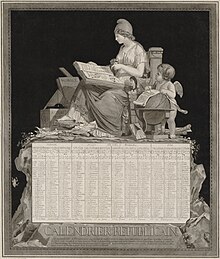Chronologia
Chronologia (Graece χρόνος 'tempus' + -λογία 'studium')[2] est scientia eventuum per ordine temporalem ordinatorum, saepe per lineam temporalem vel sequentiam eventuum praebitorum. Chronologia etiam est "cognitio verae eventuum praeteritorum sequentiae temporalis."[3][4]




Chronologia in maiore significatione est pars periodizationis. Pars quoque est historiae, disciplinae academicae quae historiam telluris, scientiam telluris, et studium aevorum geologicorum comprehendit.
Nexus interni
- Annales
- Annales Romae antiquae
- Annus
- AUC
- Biochronologia
- Calendarium
- Chronologia (liber Roberti Antissiodorensis)
- Chronologia Antiquitatis Posterioris
- Chronometria
- Circa
- Computatio radiocarbonica
- Computus paschalis
- Continuum spatio-temporale
- Dendrochronologia
- Fasti
- Floruit
- Geochronologia
- Historiographia
- Horologium
- Mensis
- Millennium
- Olympias
- Praeterita
- Saeculum
- Stratigraphia (archaeologia)
- Stratigraphia (geologia)
- Terminus ante quem
- Terminus post quem
Notae recensere
- ↑ Richards, E. G. (1998). Mapping Time: The Calendar and History. Oxoniae: Oxford University Press. pp. 12–13. ISBN 0-19-286205-7.
- ↑ "Chronology," Encyclopaedia Britannica, ed. undecima (1911), 6: 305.
- ↑ Anglice "the determination of the actual temporal sequence of past events."
- ↑ Memidex/WordNet, "chronology," memidex.com Formula:Webarchive (accessus 25 Septembris 2010).
Bibliographia recensere
Res saeculo 18 editae recensere
- Hodgson, J., J. Hinton, et J. Wallis, J. 1747. An introduction to chronology:: containing an account of time; also of the most remarkable cycles, epoch's, era's, periods, and moveable feasts: To which is added, a brief account of the several methods proposed for the alteration of the style, the reforming the calendar, and fixing the true time of the celebration of Easter. Londinii: Printed for J. Hinton, at the King's Arms in St Paul's Church-yard.
- Weeks, J. E. 1701. The gentleman's hour glass; or, An introduction to chronology; being a plain and compendious analysis of time. Dublini: James Hoey.
Res saeculo 19 editae recensere
- Brinckmeier, Eduard. (1882) 1972. Praktisches Handbuch der historischen Chronologie aller Zeiten und Völker, besonders des Mittelalters. Berolini 1882, Graz 1972.
- Hegewisch, D. H., & Marsh, J. (1837). Introduction to historical chronology. Burlingtoniae Montis Viridis: C. Goodrich.
- Ideler, Ludwig. 1825. Handbuch der mathematischen und technischen Chronologie. Berolini.
- Lersch, Bernhard Maximilian. 1889. Einleitung in die Chronologie. Aachen.
- Rühl, Franz. 1897. Chronologie des Mittelalters und der Neuzeit. Berolini.
- Smith, T. 1818. An introduction to chronology. Novi Eboraci: Samuel Wood.
Res saeculo 20 editae recensere
- Aitken, M. 1990. Science-Based Dating in Archaeology. Londinii: Thames and Hudson.
- Bickerman, E. J. 1980. The Chronology of the Ancient World. Londinii: Thames and Hudson.
- Freeman-Grenville, G. S. P. 1975. Chronology of world history: a calendar of principal events from 3000 BC to AD 1973. Londinii: Collings.
- Kazarian, K. A. 1973. "History of Chronology by B. E. Tumanian." Journal for the History of Astronomy 4: 137.
- Keller, H. R. 1934. The dictionary of dates. Novi Eboraci: The Macmillan Company.
- Langer, W. L., et H. W. Gatzke. 1963. An encyclopedia of world history, ancient, medieval and modern, chronologically arranged. Bostoniae: Houghton Mifflin.
- Leschhorn, Wolfgang. 1993. Antike Ären: Zeitrechnung, Politik und Geschichte im Schwarzmeerraum und in Kleinasien nördlich des Tauros. Historia. Einzelschriften, 81. Stutgardiae: Steiner. ISBN 3-515-06018-9.
- Momigliano, A. 1963. "Pagan and Christian Historiography in the Fourth Century A.D." In The Conflict Between Paganism and Christianity in the Fourth Century, ed. A. Momigliano, 79–99. Oxoniae: The Clarendon Press.
- Neugebauer, O. 1975. A History of Ancient Mathematical Astronomy/ Springer-Verlag.
- Poole, R. L., et A. L. Poole. 1934. Studies in chronology and history. Oxoniae: Clarendon Press.
- Porter, T. M. 1991. "The Dynamics of Progress: Time, Method, and Measure." The American Historical Review.
- Richards, E. G. 1998. Mapping Time: The Calendar and History. Oxoniae: Oxford University Press.
- Samuel, Alan E. 1972. Greek and Roman Chronology: Calendars and Years in Classical Antiquity. Monaci.
- Schram, Robert. 1908. Kalendariographische und chronologische Tafeln. Lipsiae.
- Steinberg, S. H. 1967. Historical tables: 58 B.C.-A.D. 1965. Londinii: Macmillan.
- Tumanian, B. E. 1974. "Measurement of Time in Ancient and Medieval Armenia." Journal for the History of Astronomy 5: 91–98.
- Whitrow, G. J. 1990. Time in history views of time from prehistory to the present day. Oxoniae: Oxford University Press.
- Williams, N., et R. L. Storey. 1966. Chronology of the modern world: 1763 to the present time. Londinii: Barrie & Rockliffe.
Res saeculo 21 editae recensere
- Caroli, Christian A. 2007. "Eine kurze Einführung in die Chronographie." In Europa und der Islam: As-Sabil Sammelbände für Kulturpluralismus, ed. M. Badawi et Christian A. Caroli, 1: 213–29. Constantiae. ISBN 3-938828-04-8.
- Chattopadhyay, Subhasis. 2015. "Chronicity and Temporality: A Revisionary Hermeneutics of Time." Prabuddha Bharata or Awakened India, 120 (10): 606-609 (2015). ISSN 0032-6178.
- Fréchet, Hélène. 2005. Chronologie universelle du Big Bang à nos jours. Ellipses Marketing. ISBN 2-7298-1739-5.
- Fritze, Ronald H., et al. 2004. "Chronologies, Calendars, and Lists of Rulers." Ed. secunda. Reference Sources in History: An Introductory Guide. ABC-CLIO. ISBN 978-0-87436-883-3.
- Koselleck, R. 2002. "Time and History: The Practice of Conceptual History: Timing History, Spacing Concepts. Palo Alto: Stanford University Press.
- Smyntyna, Olena V. 2009. "Chronology". In Encyclopedia of Time: Science, Philosophy, Theology, & Culture, ed. H. James Birx. Sage. ISBN 978-1-4129-4164-8.
- Rosenberg, Daniel, et Anthony Grafton. 2009. Cartographies of Time: A History of the Timeline. Novi Eboraci: Princeton Architectural Press. ISBN 9781568987637.
Nexus externi recensere
- "Dating the Past."
- "Pragmatic Bayesians: a decade of integrating radiocarbon dates in chronological models."] University of Sheffield. Internet Archive.
- Open Library. Opera ad chronologiam pertinentia.
- General Chronology in The Catholic Encyclopedia: an international work of reference (Novi Eboraci: Appleton, 1907–1914) (Anglice)